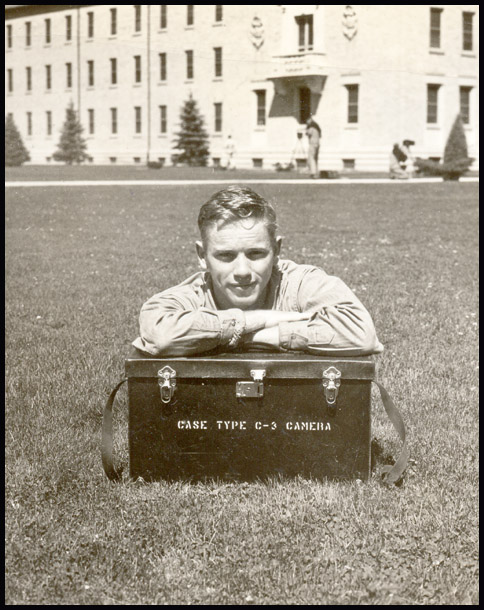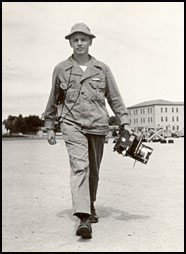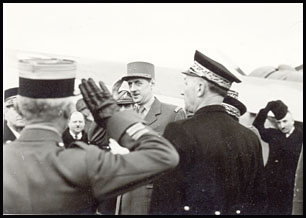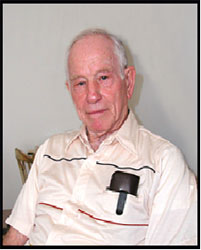

  |
|

|
Name: Milton Meyer Cohen at Laramie Field, CO Date: September 1942 Image Number: MC06cdMC01 Comments: Milton Meyer Cohen moved from Lynchburg to Scottsville in June 1931, with his parents, Benjamin and Fanny Hannah Kulman Cohen. His parents owned and operated The Hub, a Scottsville clothing store. He graduated from Scottsville High School in 1934 and worked in New York City and Alexandria, VA. In 1937, when he was working in an Alexandria warehouse, a storage bin filled with automobile parts fell over on Milton and broke his back. He was 20 years old, and after recuperating, Milton applied for a job in the ticket office at Union Station, Washington, DC, where he worked until drafted into the U.S. Army Air Corps in June 1942. After WWII, Milton went back to work at Union Station but returned to Scottsville in June 1946 to operate the family�s clothing business. Milton currently resides in Charlottesville, VA. The Lynchburg draft board called me up in June 1942 and when I reported in Lynchburg, I was put on a bus headed for Roanoke with other draftees for our medical exams. As I sat there in the examining area with my friend, I didn�t pay any attention to the numbered tag I was wearing. I thought I�d passed the examination, but then a sergeant called out a series of numbers, and my friend said, �Milton, they called your number!� So I went up and asked the sergeant if he had indeed called my number. �Yes, you can go home � you have had a broken back.� I returned to Scottsville to see my parents and get my father to fix me up with some new clothes � I hadn�t bothered to get any new clothes for awhile because I anticipated getting drafted. My father fixed me up with a new suit, a couple new shirts, and a pair of shoes. Then the Chairman of the Lynchburg Draft Board called me to say that they had made a mistake: I had been accepted for active military service and was to report for duty in Lynchburg the next day. I turned to my father and said, �Cancel my order � I won�t need new clothes. I�m in the Army now!� On June 18, 1942 in Lynchburg, I boarded a troop train to Camp Lee in Richmond and arrived there at 5 AM the next morning. I walked in, not knowing what to expect, and was told, �Raise your right hand � you�re sworn into the Army.� I stayed at Camp Lee for three weeks for indoctrination and shots before being shipped off by train to Biloxi, Mississippi. I was assigned to the Army Air Corps and did all of my training and aptitude training there. I was qualified to be a radio technician --- which meant I had to get back on the train again with shipping orders to Scott Field Air Base, East St. Louis, Illinois. But we passed on by St. Louis, and I said, �Wait, I�m supposed to get off here!� But I was told, �No, you�re not.� So we didn�t know where we were going �the train crewmen knew, but they couldn�t tell us for war secrecy reasons. The night before we reached our destination, a crewman came and told us that we were going to Denver, CO. What�s in Denver? A photography training school. And so that�s why I wound up in Laramie Field in Denver, CO, in late August 1942. Life is sure full of surprises!
Then I finished photography school and got on the train again � this time we ended up in Atlantic City for Army Air Corps training. I marched up and down the field a lot and went to classes in sanitation. Then we got on the train again -- this time to Camp Kilmer, NJ for the overseas processing. They asked me all about my physicals and I told them about everything that had happened to me. The doctors X-rayed my back again, and later the sergeant technician came out to tell me: � Man, you�re not going anywhere but home!� The doctor, a Major, came out and said, �How, the hell did you get here?� I told them all about my records, everyplace I�d been, and how I�d gotten to that point. �Well, you�re going home.� Two days, later I was on a ship going overseas � they never cut me any orders to go home.
One day, I bent down to lift up a small box and went �OHHHH!� -- my back went out! The box turned out to be filled with 250 lbs. of commercial hardware. I went into the depot hospital, and after they x-rayed me, the doctors said, �You�re going home!� Of course, I believed I was going home, but, no, they discharged me to �limited duty� in another unit. I would not see home until October 1945. 
My new assignment in Algeria was in a photographic unit � a good fit because, of course, my MO was that of a photographer. My new unit not only took photographs but also taught aircraft recognition � we had double duty. First I had to learn about airplanes. We had one man in the unit making slide silhouettes for use on a slide projector. After I learned about all the different airplanes, I had to learn how to make the slides, use the slide projector, and give lessons to various units on recognizing the aircraft. We went out on assignments all over North Africa to teach ground antiaircraft units � we even taught French and British units in Tunisia. Then we moved to Casablanca for awhile and then to Constantine, where we were stationed months. The Army took over a hotel, and we had our photo lab in its basement. One Friday night I went to services at the synagogue in Constantine, and as I walked down the steps to go back to work, a man with a little boy was waiting for me. He was French Jewish but spoke pretty good English. �Won�t you come over to our house?� he asked. I was a little on the shy side and answered, �No, I don�t believe so.� And the little boy, who couldn�t have been more than 5 or 6, looked up at me with big eyes and said, �Please, please, please?� I said, �I can�t turn him down!� So I went to the house of the Melki family for dinner. I was stationed in Constantine for over a year and a half, and every Friday night after Synagogue, the Melkis invited me to their house for dinner. So I became pretty well acquainted with them. But in the service, I would have to go out on various assignments. We traveled in teams; two of us would go out on assignment for one or two weeks to teach a unit about aircraft recognition. In Constantine itself, we weren�t close to any airfields, and so our photographic unit didn�t do much photographic work except public relations shots. And we did develop a lot of film. 
From Constantine, I went on assignment with the French and British in the Bizerti area of the Tunisian coast. The invasion of Sicily was coming, and we taught the British and French soldiers all about aircraft recognition. Their air strip was in the heart of the desert, where the British Desert Air Force had built metal runways on the sand. In the daytime, you could work up until about 1 o�clock, and then you couldn�t stand the heat. It was too hot to do anything. So we�d stay in the tent, where fortunately a little breeze would blow through the open flaps of the tent. About 5 o�clock, it would start cooling down, and we could work again. But forget about doing anything between 1-5PM. We taught our classes early in the morning but had to have the tents dark so we could show our slides of the aircraft. It was HOT even then! But I got through that assignment all right.
Then the invasion of Sicily came off, and we moved into Italy. We moved from Constantine to Naples, and set up quarters there. Still we went out on assignments as we did in North Africa: teaching aircraft recognition and taking care of anyone�s photographic needs, cropping film and prints.
From there, our unit was disbanded, and I was sent on duty to guard the Army dumps where materiel to be shipped back to the States was being gathered. I was Sergeant of the Guard one night, and we shot one guy. I had to go tell the family that we shot him. Well, the Italians knew better, that they weren�t supposed to steal from these military dumps. We fired several warning shots over their heads to scare them off, but this one guy was so bold, that he just walked in anyway. Our guards shot and killed him. So I went to the hospital with his body and met with his family there � I had to tell them what had happened to their son. Next I was sent to Naples to get ready to go home. We were in the bottom of an extinct volcano where the King�s hunting lodge was located. The road circled around the volcano to the bottom. Of course, we had German POWs to help clean up after our equipment was loaded onto ships. Chestnut trees grew everywhere -- it was the first time I�d ever seen chestnuts. I thought they were brown, but instead they�re inside prickly pods. You have to wait until the pods dry to crack them open, but we had plenty of chestnuts. Finally, I got on the ship there and came home. 
I came back to Union Station in Washington, DC, to work there. Soldiers that were drafted in WWII were guaranteed their old jobs back. And Union Station was glad to have me back on the job. I was so happy to get back after being overseas for 33 months that it didn�t take me long to get adjusted! It was very easy to adjust to civilian life after being in the Army. The only difficulty Rosemae and I had was finding a place to live in Washington. But that worked out all right, too, because that accelerated our return to Scottsville � we moved back home on July 1, 1946. The photos of the Milton Cohen during World War II are part of the Milton Cohen collection. Milton resides in Charlottesville, Virginia. Copyright © 2001 by Scottsville Museum |
|
|
|
Museum
Archive
Business
Cemeteries
Church
Events
Floods
Homes
Portraits
Postcards
School
Transportation
Civil War
WWII Search Policy |
||||
|
Scottsville Museum · 290 Main Street · Scottsville, Virginia 24590 · 434-286-2247 www.avenue.org/smuseum · [email protected] Copyright © 2001 by Scottsville Museum |
||||